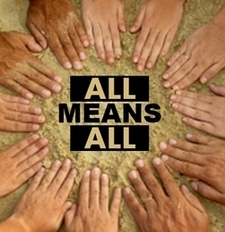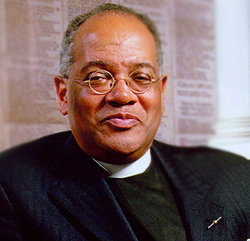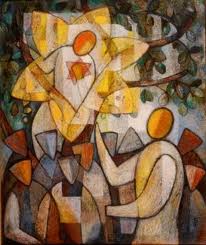 For four years from 2005 to 2009, I was an Appointed Missionary of The Episcopal Church, serving in Sudan. That means that I was your missionary, representing you, to the people of Sudan, the largest nation in Africa.
For four years from 2005 to 2009, I was an Appointed Missionary of The Episcopal Church, serving in Sudan. That means that I was your missionary, representing you, to the people of Sudan, the largest nation in Africa.
I was there at the end of a long civil war, a 23-year civil war, and I lived on the border between North and South, where Northerners met Southerners, where Arabs met Blacks, where Muslims met Christians. I lived in an area that is now the northernmost point of the new country of South Sudan.
The area in which I lived, called Renk, was an area during which the 23-year civil war, the North was in control. Which meant there was no fighting going on. So people would flock to Renk from all over South Sudan, so that they could avoid a brutal civil war.
By the time I got there, the town was about 3,000 people and we had members of least 15 different tribes living in this small town. Now this is highly unusual in South Sudan, because that was a country, still to this day, where your tribe counts – more than anything else. Not the nation in which you live, not the region in which you live, but what tribe you belong to.
Because we had people from so many tribes living in South Sudan, it meant that our common language was Arabic, the language of the oppressors of the North. We didn’t speak classical Arabic; we actually spoke what is known as Sudani Creole, meaning, “Heaven forfend we should bother to conjugate a verb.” We never conjugated our verbs; that’s what Creole means.
And so the language I spoke, and the language in which I still pray, is Arabic. But every once in a while, people would challenge me on this and want to know why I was not learning the language of the predominant tribe in the area in which I lived. That tribe is more commonly known as Dinka; they are correctly known as the Jieng.
It was very important for them, they thought, that I spoke their language because then I would be proclaiming that I belonged to their tribe.
Well, one day, I was up in Khartoum, in the capital of what was then the whole country, now the capital of the northern part known as Sudan, and we were sitting on the street corner of a dusty road, and we were drinking tea, because Starbucks in Sudan – wait a minute, no, I’m up in New England – Dunkin’ Donuts in Sudan is out on a log, and the lady makes your coffee or your tea over a little open charcoal fire.
And so a bunch of us were sitting out there, and dusk was coming, so the heat was coming down, and we were drinking our tea, and these three young men, who did not know me – but they knew I was a white person, and they knew I was with the Church – challenged me. “What tribe do you belong to?” they said.
Now, I have to tell you by this time, I was tired as spit of this question. I was tired of being told I had to declare for one of the tribes, when I had friends in all 15 of the tribes in my own town. I was tired of being told I had to learn one of the tribal languages, which would exclude, necessarily, all the other people.
And so I looked at these young men and said, “I belong to the most important tribe there is. I belong to the tribe of God.”
They looked at me, and I said, “There is nothing more important, nothing else I need to know in my life. I belong to the tribe of God.”
I went back to my town, and I found out that word was spreading, that people were saying, “Lauren is refusing to join any of our tribes because she belongs to the tribe of God.”
And that is what the Church in South Sudan is doing. The Church in South Sudan is breaking down those barriers, overcoming those barriers, crossing all the boundaries, so that they can proclaim that all of us are indeed of one tribe, the tribe of God.
My friends, I need to tell you, this is what Paul is talking about in his letter to the Ephesians this morning. Now if you go back and look at the letter to the Ephesians – which I highly recommend you do – take a look at what Paul is saying in there.
I’m going to tell you that lots of preachers right now are talking about how this is a way in which we’re supposed to come together in unity and stop arguing over the color of the carpet in your church.[1]
This is the time when we’re supposed to stop arguing over whether we heat the water in the bathrooms. That’s how this letter is used – very mildly, very tamely.
Anybody who uses it that way, though, is not paying any attention to Paul. Because this letter of Paul, this section of Paul’s letter? This is a cry for revolution!
This is a cry to turn over the powers and principalities which in Paul’s day were known as Rome.
In the days when Paul walked the earth, people were segregated. They were segregated by their tribes, their race, their ethnicity, their language, and most of all, by their jobs. You didn’t get to choose what job you had in those days. If you were born into a family of farmers, you were going to be a farmer. If you were born in a fisherman’s family, you were going to fish. If you were born into a tentmaker’s family, you were going to make tents. This was not an option. This is how society worked. And people gathered together around their jobs, and then they subdivided around their race, their ethnicity, and their language. That was how you got protection. They formed unions to take care of each other. If you got sick, and your family was a thousand miles away, the union took care of you. You paid your dues in, and they took care of you. Everybody was subdivided that way, and Rome used this to rule the world. They

made sure that everybody knew their little place, and by God, don’t you ever get out of place. Because any time you tried to get out of place, it was like Whack-a-Mole™ – whack! And they would knock you down.
So what is Paul talking about in his letter to the Ephesians? He’s talking about those who were aliens and strangers now being joined together. The circumcised – the Jews – and the uncircumcised – the Gentiles – are now coming together. He’s talking about tearing down all the barriers, all the boundaries; he’s talking about tearing down the walls that divide us, so that we could all unite in the one tribe that matters, the tribe of God.
He is preaching sedition.
“Let me just send a nice little letter to the people in the church. ‘Dear People of the Church of St. James in Amesbury, Massachusetts: RISE UP! TEAR DOWN YOUR WALLS! IT’S TIME FOR REVOLUTION!’” This is subversive.
That’s what Paul is doing!
He’s calling for a revolution. No wonder the Romans couldn’t wait to get rid of him. Paul was doing the same thing that Jesus did. He was changing people. He was changing society.
My friends, this is our call. In this day and age. We are hearing a clarion call to subversion, to revolution, to tear down the walls!
Now I know y’all know something about tearing down walls. Because I understand you had to tear down this wall (in the back of the church) down to its bare basics, and change out the window. You had to do something different, and you had to rebuild it.
That’s what you are being called to do in society.
So that nobody ever says, “What tribe do you belong to? What tribe do you belong to?” and separates you out. Nobody says, “So what do you do for a living,” knowing that you can only hang out with people who do the exact same thing.
The revolution we’re being called to participate in, the revolution we’re being called to lead, is to tear down all the walls so that we can all proclaim that we … belong … to the … tribe … of God. And that the tribe of God is the only tribe that counts.
It doesn’t matter what you look like, it doesn’t matter what your age is, doesn’t matter where you came from, it doesn’t matter the language you speak. Nothing matters at all; that’s all gravy. The only thing that matters is that you are a beloved child of God and belong to the tribe of God, and that’s it. Everything else? Meh! That’s just the way the genetics worked out. It’s a chemical crapshoot. It’s not important.
The revolution we are being called to lead, my friends, is a revolution that lets every person in the community, every person in the world, know that they belong. It’s a way of saying to every person, “You are a beloved child of God.” It’s a way of saying, “God loves you. And God loves you. And you. And you. And you. And you. And you. That God loves you. And you. That God loves you. And you. And you. And you.
If we all belong to the tribe of God, and we’re all beloved children of God, then our call is to live out that love in the world.
Now I want to take a moment to kind of do a sidestep in this sermon and to address something that I know is on everybody’s hearts and minds, which are the shootings out in Aurora, Colorado, that took place on Thursday night/Friday morning. Where a young man, for unknown reasons, walked into a movie theater and shot 70 people, killing 12 of them.
We don’t know why he did it. We know enough of this young man’s history to know that he is brilliant. He was a PhD candidate soaring through his program in psychology. And then something happened. And we don’t know what.
Well, I can tell you this:
If we were all out there proclaiming revolution, proclaiming the revolutionary idea that you are a beloved child of God and you belong to the tribe of God, I can tell you that incidents like this would happen a whole lot less.
Was this this young man’s cri de couer, “Pay attention to me, notice me, let know that I’m important”?
I don’t know.
But if we take the time to let each person know that they are important, that they are beloved, that they are accepted, that they belong, I am telling you there will be fewer incidents like this.
Paul is telling us to tear down the walls. If we tear down the walls, more people will belong, more people will understand that they are beloved, and fewer people will do what Mr. Holmes did in Aurora, Colorado, at 1 o’clock in the morning on Friday.
I want to step back in and tell you that for two weeks, I was at the General Convention of The Episcopal Church. It was my fifth General Convention, and I love going. I love going to big family reunions where we engage the entire world and stare at our navels at the exact same moment! I love it when we have amendments to the amendments to the substitution, call the question! I love what we do at General Convention. I walked out of this particular General Convention, where we as a church said, “By God, we’re going to include people. All means all, and all belong, and all are beloved children of God.”
 I walked out of that Convention going, “Yes! Finally we’re beginning to get it.” And I walked right to the airport, smack dab into an article in The Wall Street Journal, where some guy in New York says, “I’m an Episcopalian. I didn’t like what they did. They have lost their way. Those Episcopalians are too liberal. Those Episcopalians are just following society.” And then he told a bunch of lies about what we did there. It would help if he had paid attention. But he actually did not pay any attention, and so he was misquoting us 17 ways from Sunday, and he said we did things we hand’t done, and I’m like, “Dude. You so missed that boat.”
I walked out of that Convention going, “Yes! Finally we’re beginning to get it.” And I walked right to the airport, smack dab into an article in The Wall Street Journal, where some guy in New York says, “I’m an Episcopalian. I didn’t like what they did. They have lost their way. Those Episcopalians are too liberal. Those Episcopalians are just following society.” And then he told a bunch of lies about what we did there. It would help if he had paid attention. But he actually did not pay any attention, and so he was misquoting us 17 ways from Sunday, and he said we did things we hand’t done, and I’m like, “Dude. You so missed that boat.”
I was ready to write him off. Until The New York Times, on Sunday, last week, decided to run an article by Ross Douthat, who is – for some unknown reason – supposed to be the spokesman in the country right now about the future of Christianity. I don’t know why – because he says we’re dead.
And he turns around and he says, “The liberal Episcopalians are doing nothing, except following society. The liberal Episcopalians have no idea what their theology is. The liberal Episcopalians” – he must have called us that like, 14 times – and I’ll tell you something. You know what my answer is?
We are not following society willy-nilly. We are dragging society forward to where God wants us to be! We are at the forefront of saying to people, “Enough! Tear down the damn walls! Everybody belongs! All really does mean all!” God does not differentiate. God doesn’t say, “Oh, you’re in, and you’re out.”
There are no “us’s” and “thems” in God’s very good creation, folks. There are no “us’s” and “thems.” God does not say, “Well, I don’t like you. But I like you.” God doesn’t run around doing that! God says, “You are my beloved.”
God created us in God’s image, an image of love – because we are not necessary to God. God is necessary to us, but we are not necessary to God, because God was before we were, and God will be after we are, so we cannot be necessary. So guess what? That means God loved us into being. That God desired us into being. So it means that we are each beloved.
And because we are Trinitarians, we are Christians, we believe in God the Father, God the Son, God the Holy Spirit, we believe in community. Because nowhere in the way we read the Scriptures do God the Father and God the Son go off and do the work while God the Holy Spirit is over here, drinking a martini. If they’re drinking martinis, they’re all doing it together! If they’re working, they’re all doing it together. We’re created in that image. That means we’re created in community.
So, we are created in love and in community to live in love and in community. And The Episcopal Church is leading the way in doing this by saying, “All does mean all. There will be no more walls! You come into this church, we baptize you, you have access to everything in the church.” We’re no longer going to say, “Well, we’ll baptize you, we’ll confirm you, but we won’t marry you. We won’t let you be a priest. Or we’ll let you be a priest, but you can’t be a bishop. Uh, uh, uh, uh, we have limits.” No! Because there are no limits to God’s love.
That’s what Paul is talking about in this morning’s epistle. It’s not some namby-pamby-don’t-argue-over-the-color-of-the-carpet-in-the-church.
He’s calling us to revolution.
And I want to know:
Are you all ready?
Are you ready to be revolutionaries?
Are you ready to go into the world and to show the world a whole new way to live?

Are you ready to be bold? (A young teen cries out, “Yes!”)
You are! Good!
Are you ready to be bold and to say, “All means all”? That each of you is a beloved child of God?
I’ve got one volunteer here, do I have any more?
How many of you want to be told you don’t belong? How many of you want to stand at that door and be told, “You can’t come in”? Anybody here?
If you’re not willing to be excluded, if you are not willing to be told that you are not loved, then how dare you exclude? And how dare you tell anybody that they are not loved? Because then you have to answer, not to me, not to Susan, not to your bishop. You have to answer to God.
The only question God will ask you, when you get to those pearly gates: “Did you love?”
Tear down the walls that get in the way of God’s love.
Tear down the walls that separate us as a society.
Tear down the walls that keep us in, and them out, because there are no “us’s” and “thems.”
My friends, we’re supposed to be revolutionaries!
Are you ready?
Are you ready to be revolutionaries for God?
Amen.
Sermon preached on the Eighth Sunday after Pentecost, Proper 11, Year B, at St. James Episcopal Church, Amesbury, Mass., 22 July 2012.




















